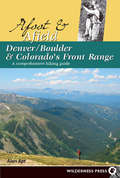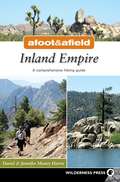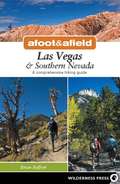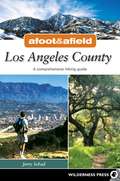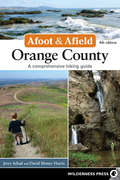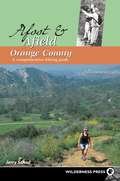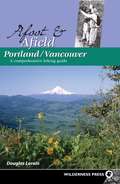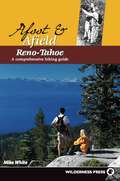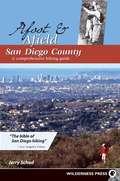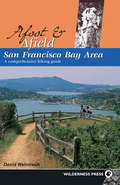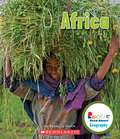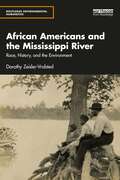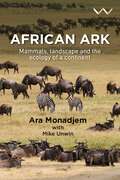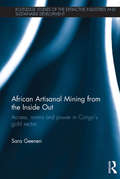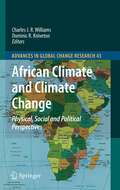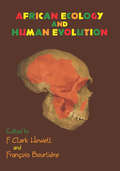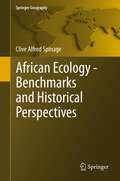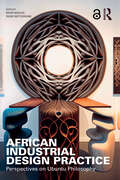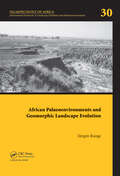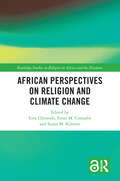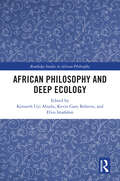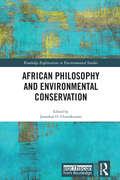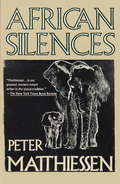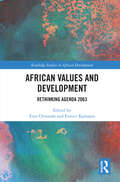- Table View
- List View
Afoot and Afield: Denver/Boulder and Colorado's Front Range
by Alan AptThis guidebook takes hikers throughout the Colorado Rocky Mountains and their foothills, rivers, and plains. Featuring more than 200 trips, from trails near the state's Wyoming border to Pikes Peak near Colorado Springs, author Alan Apt maps out hikes both long and short, exploring trails accessible from Denver, Boulder, and other Front Range communities. Each hike has it's own map, and includes essential at-a-glance info as well as additional trail-use data such as which trails are suitable for children, dogs, horseback riding, and mountain bikes.
Afoot and Afield: Inland Empire
by David Money Harris Jennifer Money HarrisThe Inland Empire-the area east of Los Angeles and located primarily in San Bernardino and Riverside counties-is known as Southern California's big backyard. And with its mountain, foothill, valley, and desert recreational opportunities, it's a hiker's paradise. Afoot & Afield Inland Empire describes nearly 200 noteworthy hikes ranging from easy to very strenuous in this first comprehensive hiking guide to the length and breadth of Inland Empire. These hikes explore Southern California's three tallest mountains, the stark beauty of the high desert, including Joshua Tree National Park and Mojave National Preserve, as well as trails that wind through urban and regional parks. Each hike is shown on custom-created maps that also include GPS waypoints: the maps alone are worth the price of the book.
Afoot and Afield: Las Vegas and Southern Nevada
by Brian BeffortBeyond the bright lights of one of the city's fastest growing metropolitan areas is some of the most rugged, beautiful, and remote country around. Popular destinations such as Red Rock Canyon, Valley of Fire, Death Valley, and Mt. Charles are covered, plus lesser-known areas such as Anniversary Narrows, Arrow Canyon, Bowl of Fire, and the Wee Thump Joshua Tree Wilderness. Each trip showcases the diversity of this region, from the geological wonders and rare life forms surviving in Mojave National Preserve to ancient petroglyphs. The hikes range from easy strolls to challenging treks and include distance, time, elevation change, difficulty, and trail-use notes. A custom map accompanies every description, and GPS waypoints are given for key locations.
Afoot and Afield: Los Angeles County
by Jerry SchadJerry Schad is your knowledgeable and reliable guide for the 192 trips in this book--ranging from gentle family walks in Griffith Park to strenuous treks over the spine of the San Gabriel Mountains. Whether you see solace from the crowds, a cardiovascular workout, or a new perspective of the natural world around you, this book provides all you need to know.The second edition of this popular book covers all of the county's open spaces. A total of 192 hikes-including 17 new ones-are described in detail with trips organized into specific areas. Illustrated; detailed maps.
Afoot and Afield: Orange County
by Jerry Schad David Money HarrisThis completely updated and expanded new edition in the Afoot and Afield series is the classic guide to the hiking opportunities throughout Southern California's Orange County. Featuring more than 100 trips from serene summits to sparkling beaches, Afoot and Afield Orange County covers the Laguna Coast, Newport Beach, Crystal Cove State Park, the Chino Hills, Santa Rosa Plateau Ecological Reserve, the Santa Ana Mountains, and more. Trips ranging from short strolls to rigorous daylong treks are all within a short car trip of the Southland's cities. Every trip was re-hiked by coauthor David Money Harris for this updated edition.
Afoot and Afield: Orange County
by Jerry SchadThis completely updated and expanded new edition in the Afoot & Afield series is the ultimate guide to the hiking opportunities throughout Southern California's Orange County. Featuring 87 trips from serene summits to sparkling beaches, Afoot & Afield Orange County covers the Laguna Coast, Newport Beach, Crystal Cove State Park, the Chino Hills, Santa Rosa Plateau Ecological Reserve, the Santa Ana Mountains, and more. Trips ranging from short strolls to rigorous daylong treks are all within a short car trip of the Southland's cities.
Afoot and Afield: Portland/Vancouver
by Douglas LorainIn nearly 200 trips Afoot & Afield Portland/Vancouver covers every hike within a one-hour drive of this metropolitan area. Hit the trail through dense old-growth forests, walk beside waterfalls, climb to viewpoints above massive glaciers, or wander through the quiet forests of a 5000-acre park in metro Portland itself. The hikes range from simple strolls through urban preserves to rugged climbs in the Columbia River Gorge and on glacier-clad Mt. Hood. Hikes that are great in cloudy weather are labeled, and each hike is shown on an up-to-date map. Each hike includes at-a-glance essential information - distance, time, elevation change, and difficulty rating.
Afoot and Afield: Reno-Tahoe
by Mike WhiteThis title in Wilderness Press's successful Afoot & Afield series is the most comprehensive outdoor guide to the vast backcountry surrounding Reno and Lake Tahoe. This guide features more than 150 trips in the Reno and Lake Tahoe region, including Graeagle, Truckee, Echo Summit, Mt. Rose, and Carson Valley. Trips range from easy strolls to challenging treks and include distance, time, elevation gain, difficulty, and trail notes.
Afoot and Afield: San Diego County
by Jerry SchadThe Los Angeles Times has hailed Southern California' hiking guru Jerry Schad's Afoot & Afield San Diego County as "the bible of San Diego hiking." Encompassing the county from Sunset Cliff Park and the Bayside Trail at Point Loma to Fonts Point in the Borrego Badlands, this hiking guide is the "must-have" to explore San Diego's diverse outdoors. The book covers all the worthwhile hiking destinations throughout the county - including the coast, foothills, mountains, and desert - in trips ranging from the short family excursions to multi-day backpacks. This long-awaited fourth edition of San Diego County's most recognized and comprehensive hiking guide has been fully updated and expanded to cover 250 hikes. All new maps.
Afoot and Afield: San Francisco Bay Area
by David WeintraubThis title in the acclaimed Afoot & Afield series contains more than 100 carefully described trips in the nine-county region. Included are all the well-known favorites: Mt. Tamalpais, Point Reyes National Seashore, Henry W. Coe and Mt. Diablo state parks, and Rancho San Antonio Open Space Preserve. The book also features more remote parks and preserves, from the rugged Sonoma coast to hidden canyons south of San Jose, as well as regional open spaces and country parks from the East Bay hills to the Santa Cruz Mountains.
Africa (Rookie Read-About Geography)
by Rebecca E. Hirsch<p>Get ready for a fascinating trip around the seven continents of the world! Simple, engaging text and colorful, mesmerizing pictures teach you about each continent's land features, populations, native animals, technological advances, and lots more—including how to find each continent on a map! <p>Africa is a large and diverse continent, and young readers will love discovering the people, geography, and animals found there.</p>
African Americans and the Mississippi River: Race, History, and the Environment (Routledge Environmental Humanities)
by Dorothy Zeisler-VralstedThis book follows the historical trajectory of African Americans and their relationship with the Mississippi River dating back to the 1700s and ending with Hurricane Katrina and the still-contested Delta landscape. Long touted in literary and historical works, the Mississippi River remains an iconic presence in the American landscape. Whether referred to as "Old Man River" or the "Big Muddy," the Mississippi River represents imageries ranging from the pastoral and Acadian to turbulent and unpredictable. However, these imageries—revealed through the cultural production of artists, writers, poets, musicians, and even filmmakers—did not reflect the experiences of everyone living and working along the river. Missing is a broader discourse of the African American community and the Mississippi River. Through the experiences of African Americans with the Mississippi River, which included narratives of labor (free and enslaved), refuge, floods, and migration, a different history of the river and its environs emerges. The book brings multiple perspectives together to explore this rich history of the Mississippi River through the intersection of race and class with the environment. The text will be of great interest to students and researchers in environmental humanities, including environmental justice studies, ethnic studies, and US and African American history.
African Ark: Mammals, landscape and the ecology of a continent
by Dr. Ara MonadjemThe story of how Africa’s mammals have helped shape the continent’s landscapes over time to support an amazing diversity of lifeAfrica is home to an amazing array of animals, including the world’s most diverse assortment of large mammals. These include the world’s largest terrestrial mammal, the African elephant, which still roams great swathes of the continent alongside a host of other well-known large mammals with hooves such as hippopotamuses, giraffes, rhinoceroses, and zebras. African Ark: Mammals, Landscape and the Ecology of a Continent tells the story of where these mammals have come from and how they have interacted to create the richly varied landscape that makes up Africa as we know it today. It gives an equal airing to small mammals, such as rodents and bats, which are often overlooked by both naturalists and zoologists in favor of their larger cousins. African Ark not only describes the diversity of African mammals and the habitats in which they live; it also explains the processes by which species and population groups are formed and how these fluctuate over time. A book on mammals would not be complete without attention placed on the impact of megafauna on the environment and the important roles they play in shaping the landscape. In this way, mammals such as elephants and rhinoceros support countless plant communities and the habitats of many smaller animals. The book brings in a human perspective as well as a conservation angle in its assessment of the interaction of African mammals with the people who live alongside them. African Ark is at once scientifically rigorous and accessible for the layperson and student alike, while drawing on the contributions of numerous zoologists, ecologists and conservationists dedicated to the understanding of Africa and its wildlife.
African Artisanal Mining from the Inside Out: Access, norms and power in Congo’s gold sector (Routledge Studies of the Extractive Industries and Sustainable Development)
by Sara GeenenArtisanal mining is commonly associated with violent conflict, rampant corruption and desperate poverty. Yet millions of people across Sub Sahara Africa depend on it. Many of them are living in eastern Democratic Republic of Congo (DRC), home to important mineral reserves, but also to a plethora of armed groups and massive human rights violations. African Artisanal Mining from the Inside Out provides a rich and in-depth analysis of the Congolese gold sector. Instead of portraying miners and traders as passive victims of economic forces, regional conflicts or disheartening national policies, it focuses on how they gain access to and benefit from gold. It shows a professional artisanal mining sector governed by a set of specific norms, offering ample opportunities for flexible employment and local livelihood support and being well-connected to the local economy and society. It argues for the viability of artisanal gold mining in the context of weak African states and in the transition towards a post-conflict and more industrialized economy. This book will be of great interest to researchers and postgraduates studying natural resources and development as well as those in development studies, African studies, sociology, political economy, political ecology, legal pluralism, and history.
African Climate and Climate Change: Physical, Social and Political Perspectives (Advances in Global Change Research #43)
by Charles J. Williams Dominic R. KnivetonCompared to many other regions of the world, Africa is particularly vulnerable to the effects of climate change and variability. Widespread poverty, an extensive disease burden and pockets of political instability across the continent has resulted in a low resilience and limited adaptative capacity of African society to climate related shocks and stresses. To compound this vulnerability, there remains large knowledge gaps on African climate, manifestations of future climate change and variability for the region and the associated problems of climate change impacts. Research on the subject of African climate change requires an interdisciplinary approach linking studies of environmental, political and socio-economic spheres. In this book we use different case studies on climate change and variability in Africa to illustrate different approaches to the study of climate change in Africa from across the spectrum of physical, social and political sciences. In doing so we attempt to highlight a toolbox of methodologies (along with their limitations and advantages) that may be used to further the understanding of the impacts of climate change in Africa and thus help form the basis for strategies to negate the negative implications of climate change on society.
African Ecology and Human Evolution
by F. Clark Howell Francois BourliereThe record of man's early evolution, though still fragmentary, is more complete on the African continent than anywhere else in the world. The ecological context of this evolution, however, has been studied intensively only in recent years. This pioneering volume draws together eminent specialists from many fields--physical anthropologists, zoologists, geologists, paleontologists, and prehistorians--who summarize here the results of their diverse research on Pleistocene environments and the cultural and biological evolution of man in Africa.This volume was sponsored by the Wenner-Gren Foundation for Anthropological Research Inc., which met at Burg Wartenstein, Austria. The editors have field experience in Africa, especially eastern and equatorial Africa. This experience is coupled with their awareness of the need to integrate results of numerous field studies bearing on the biological-behavioral evolution of higher primates with other field studies on the paleoecology and the mammalian ecology of sub-Saharan Africa.The book includes contributions on Pleistocene stratigraphy and climatic changes throughout the African continent; on the origin and evolution of the earliest man-like creatures in Africa; on the dating, distribution, and adaptation of Pleistocene hunter-gatherer peoples; and on the ecology, biology, and social behavior of African primate and human populations. The chapters reflect vividly the state of current knowledge at the time and indicate paths for future research. Over 100 maps and figures, detailed bibliographies, and a comprehensive index contribute to the importance of the volume for basic reference use.
African Ecology: Benchmarks and Historical Perspectives (Springer Geography)
by Clive Alfred SpinageIn view of the rapidly changing ecology of Africa ,this work provides benchmarks for some of the major, and more neglected, aspects, with an accent on historical data to enable habitats to be seen in relation to their previous state, forming a background reference work to understanding how the ecology of Africa has been shaped by its past. Reviewing historical data wherever possible it adopts an holistic view treating man as well as animals, with accent on diseases both human and animal which have been a potent force in shaping Africa's ecology, a role neglected in ecological studies.
African Industrial Design Practice: Perspectives on Ubuntu Philosophy
by Richie Moalosi Yaone RapitsenyaneThe underlying principle of this book is the African philosophy of Ubuntu, which acts as a guide for developing empathic products and services. The book makes the case that empathy is the key to any successful product and service design project because it enables designers to make wise design choices that align with users' demands. Fifteen chapters provide the latest industrial design developments, techniques, and processes explicitly targeting emerging economies. At the outset, it covers the design context and the philosophy of the Ubuntu approach, which places people and communities at the centre of the development agenda. The book covers new product development, design research, design cognition, digital and traditional prototyping, bringing products to the market, establishing a company's brand name, intellectual property rights, traditional knowledge, and the business case for design in Afrika. It concludes with a discussion about the future of design and the skills aspiring designers will need. African Industrial Design Practice: Perspectives on Ubuntu Philosophy will be an essential textbook for undergraduates, postgraduates, instructors, and beginner designers in emerging economies to provide regionally contextualised design processes, illustrated examples, and outcomes.
African Industrial Design Practice: Perspectives on Ubuntu Philosophy
by Richie Moalosi Yaone RapitsenyaneThe underlying principle of this book is the African philosophy of Ubuntu, which acts as a guide for developing empathic products and services. The book makes the case that empathy is the key to any successful product and service design project because it enables designers to make wise design choices that align with users' demands.Fifteen chapters provide the latest industrial design developments, techniques, and processes explicitly targeting emerging economies. At the outset, it covers the design context and the philosophy of the Ubuntu approach, which places people and communities at the centre of the development agenda. The book covers new product development, design research, design cognition, digital and traditional prototyping, bringing products to the market, establishing a company's brand name, intellectual property rights, traditional knowledge, and the business case for design in Afrika. It concludes with a discussion about the future of design and the skills aspiring designers will need.African Industrial Design Practice: Perspectives on Ubuntu Philosophy will be an essential textbook for undergraduates, postgraduates, instructors, and beginner designers in emerging economies to provide regionally contextualised design processes, illustrated examples, and outcomes.Chapter 2 of this book is freely available as a downloadable Open Access PDF at http://www.taylorfrancis.com under a Creative Commons Attribution-Non Commercial-No Derivatives (CC-BY-NC-ND) 4.0 license.
African Palaeoenvironments and Geomorphic Landscape Evolution: Palaeoecology of Africa Vol. 30, An International Yearbook of Landscape Evolution and Palaeoenvironments (Palaeoecology of Africa)
by Jürgen RungeThis 30st jubilee volume (2010) of "Palaeoecology of Africa" looks back and reflects the "state of the art" of what is actually known on former African climates and ecosystems in the format of review articles authored by specialists in the field. New research articles on climate and ecosystem dynamics as well as applied topics on geomorphic ha
African Perspectives on Religion and Climate Change (Routledge Studies on Religion in Africa and the Diaspora)
by Ezra Chitando, Ernst M. Conradie and Susan M. KilonzoThis book interrogates the contributions that religious traditions have made to climate change discussions within Africa, whether positive or negative. Drawing on a range of African contexts and religious traditions, the book provides concrete suggestions on how individuals and communities of faith must act in order to address the challenge of climate change. Despite the fact that Africa has contributed relatively little to historic carbon emissions, the continent will be affected disproportionally by the increasing impact of anthropogenic climate change. Contributors to this book provide a range of rich case studies to investigate how religious traditions such as Christianity, Hinduism, Islam, and indigenous faiths influence the worldviews and actions of their adherents. The chapters also interrogate how the moral authority and leadership provided by religion can be used to respond and adapt to the challenges posed by climate change. Topics covered include risk reduction and resilience, youth movements, indigenous knowledge systems, environmental degradation, gender perspectives, ecological theories, and climate change financing. This book will be of interest to scholars in diverse fields, including religious studies, sociology, political science, climate change and environmental humanities. It may also benefit practitioners involved in solving community challenges related to climate change.
African Philosophy and Deep Ecology (Routledge Studies in African Philosophy)
by Kenneth Uyi Abudu, Kevin Gary Behrens, and Elvis ImafidonThis book investigates African philosophical contributions to the concept of deep ecology, which advocates for rethinking human and non-human relationships within our ecosystems, by promoting the inherent and earned worth of all beings.With ecological crises impacting lives around the world, this book interrogates deep ecology thinking from African philosophical perspectives, highlighting the continent’s important ontological, epistemological, ethical, aesthetic, and broad philosophical contributions. The book investigates issues such as the eco-phenomenology of human / non-human animals’ relations, Ubuntu and the environment, the superiorist fallacy, environmental belongingness, the impact of colonization and modernity on non-human trauma, the politics of ecological narrative about African places, the question of moral status, African socialist perspectives, the question of degrowth, selective subordination, biodiversity loss, land ethics, the ontology of waste, and the concept of personhood in relation to global climate and ecological justice.Providing a significant intervention in our understanding of the ecological crises and our duties toward ecosystems and the non-human other in the twenty-first century, this book is an important read for researchers, advocates and other stakeholders working in the fields of environmental philosophy, climate change, indigenous studies, and African Studies.
African Philosophy and Environmental Conservation (Routledge Explorations in Environmental Studies)
by Jonathan O. ChimakonamAfrican Philosophy and Environmental Conservation is about the unconcern for, and marginalisation of, the environment in African philosophy. The issue of the environment is still very much neglected by governments, corporate bodies, academics and specifically, philosophers in the sub-Saharan Africa. The entrenched traditional world-views which give a place of privilege to one thing over the other, as for example men over women, is the same attitude that privileges humans over the environment. This culturally embedded orientation makes it difficult for stake holders in Africa to identify and confront the modern day challenges posed by the neglect of the environment. In a continent where deep-rooted cultural and religious practices, as well as widespread ignorance, determine human conduct towards the environment, it becomes difficult to curtail much less overcome the threats to our environment. It shows that to a large extent, the African cultural privileging of men over women and of humans over the environment somewhat exacerbates and makes the environmental crisis on the continent intractable. For example, it raises the challenging puzzle as to why women in Africa are the ones to plant the trees and men are the ones to fell them. Contributors address these salient issues from both theoretical and practical perspectives, demonstrating what African philosophy could do to ameliorate the marginalisation which the theme of environment suffers on the continent. Philosophy is supposed to teach us how to lead the good life in all its forms; why is it failing in this duty in Africa specifically where the issue of environment is concerned? This book which trail-blazes the field of African Philosophy and Environmental Ethics will be of great interest to students and scholars of Philosophy, African philosophy, Environmental Ethics and Gender Studies.
African Silences
by Peter MatthiessenAfrican Silences is a powerful and sobering account of the cataclysmic depredation of the African landscape and its wildlife. In this critically acclaimed work Peter Matthiessen explores new terrain on a continent he has written about in two previous books, A Tree Where Man Was Born -- nominated for the National Book Award -- and Sand Rivers.Through his eyes we see elephants, white rhinos, gorillas, and other endangered creatures of the wild. We share the drama of the journeys themselves, including a hazardous crossing of the continent in a light plane. And along the way, we learn of the human lives oppressed by bankrupt political regimes and economies, and threatened by the slow ecological catastrophe to which they have only begun to awaken.
African Values and Development: Rethinking Agenda 2063 (Routledge Studies in African Development)
by Ezra Chitando Eunice KamaaraThis book considers the importance of African values, not only in catalysing development, but in sustaining it. Arguing for an urgent need for rapprochement between African politicians and intellectuals, the book discusses how African values and identities can contribute to the successful realization of initiatives such as the African Union’s Agenda 2063 and the United Nation’s Sustainable Development Goals (SDGs). Over the course of the book, the authors consider key themes such as identity, indigenous and modern worldviews; personhood; individual and communal perspectives; peace and conflict; and well-being. The book explores the role of religion and moral values, as well as African worldviews such as Ubuntu. Overall, the book demonstrates that African values will be central to galvanising Africa’s post-colonial transformation. This book will be an important read for policymakers and for researchers working on African development, politics, sociology, religion and philosophy.
